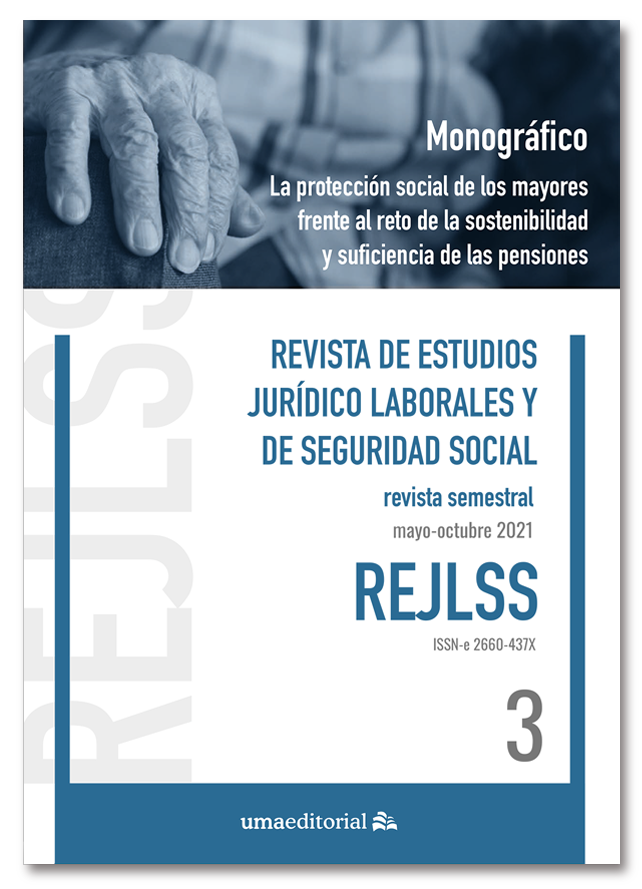Reseña de “El régimen fiscal de los planes de pensiones en favor de personas con discapacidad” (De Pablo Varona, C., Aranzadi, 2019)
DOI:
https://doi.org/10.24310/rejlss.vi3.13547Keywords:
Reseña, El régimen fiscal de los planes de pensiones en favor de personas con discapacidadAbstract
Los planes de pensiones son un instrumento que, en su origen, y siendo los gobiernos conscientes de que el envejecimiento de la población desembocaría en la insostenibilidad de las prestaciones por jubilación, se gestaron con el objetivo de que los ciudadanos tuvieran incentivos en constituir un ahorro suficiente para que, una vez verificada la contingencia, pudieran obtener una prestación complementaria a la pública que les permitiera disfrutar de una renta mensual lo más próxima posible a la que generaban en el momento inmediatamente anterior a tal contingencia. Con este objetivo en mente, se diseñó un sistema financiero y actuarial de capitalización, cuyo principal atractivo era el diferimiento de la renta a través de la reducción en la base imponible general del total de las cantidades aportadas al plan en un determinado ejercicio, hasta un máximo. Es cierto que dichas cantidades serán computadas en la base imponible general cuando se obtengan en forma de renta, pero no lo es menos que, normalmente, las prestaciones por jubilación son inferiores a las que se obtienen por el trabajo durante la vida activa lo que, conjugado con la progresividad que caracteriza a la imposición directa, da como resultado un ahorro fiscal.
Downloads
Metrics
Downloads
Published
How to Cite
Issue
Section
License
In the Revista de Estudios Juridico Laborales y de Seguridad Social (REJLSS) we are clearly committed to a policy of open access to scientific knowledge (See Berlin Declaration).
Those authors who have publications with this journal accept the following terms:
This journal provides immediate free access to its content under the principle of making research freely available to the public. All the contents published in the REJLSS are subject to the Creative Commons license
Attribution-NonCommercial-NoDerivatives 4.0 International (CC BY-NC-ND 4.0)
Copyrights are of two kinds: moral and patrimonial. Moral rights are perpetual, inalienable, non-transferable, inalienable, unattachable and imprescriptible prerogatives. In accordance with Spanish copyright legislation, the authors who publish in REJLSS retain the moral right over their work, as well as the ownership of the patrimonial right, which will be transferred to the University of Malaga for its dissemination in open access.
The patrimonial rights, refer to the benefits that are obtained by the use or disclosure of the works. REJLSS is published in open access and is exclusively authorized to perform or authorize by any means the use, distribution, dissemination, reproduction, adaptation, translation or transformation of the work.
It is the responsibility of the authors to obtain the necessary permissions of the images that are subject to copyright.
Authors whose contributions are accepted for publication in this journal retain the non-exclusive right to use their contributions for academic, research and educational purposes, including self-archiving or depositing in open access repositories of any kind.
The electronic edition of this magazine is edited by the Editorial of the University of Malaga (UmaEditorial), being necessary to cite the origin in any partial or total reproduction.
The authors may adopt other non-exclusive license agreements for the distribution of the version of the published work (eg: deposit it in an institutional telematic archive or publish it in a monographic volume) provided that the initial publication is indicated in this magazine.
Authors are allowed and recommended to disseminate their work through the Internet (eg, in institutional telematic archives or on their website) before and during the submission process, which can produce interesting exchanges and increase citations of the published work.






19.png)
